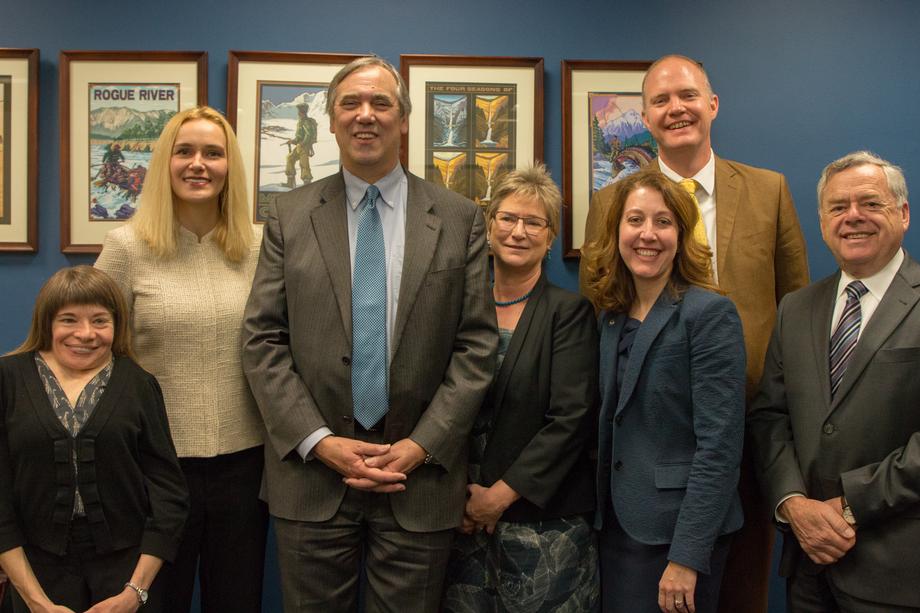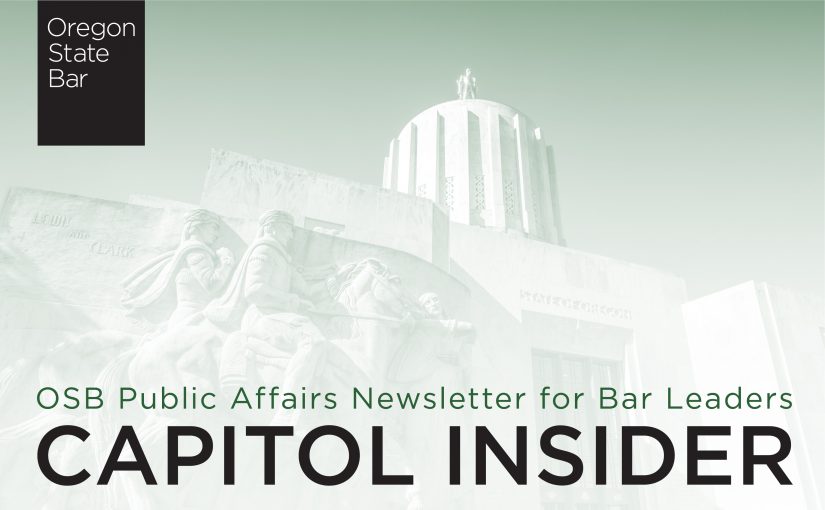Table of Contents
-
- May Legislative Days Include One-Day Special Session
- Oregon State Capitol Workplace Harassment Work Group Seeks Public Input
- 2019 Section Legislative Package Adopted by Board of Governors
- Agency Representation Standards Adopted by Board of Governors
- Oregon State Bar and the Campaign for Equal Justice Travel to DC for ABA Lobby Day
- Practice Tip: When does a bill become a law? Effective Dates and Operative Dates
May Legislative Days Include One-Day Special Session
This May, the legislature held a rare legislative special session scheduled to coincide with the previously scheduled Spring Legislative Days. On May 21, the Oregon Legislature met to modify tax treatment for some sole proprietorship. The special session, which was completed in one day, resulted in the passage of HB 4301. The bill, which passed with bipartisan support in both chambers, stemmed from legislation passed during the 2013 special session, recent changes to the federal tax code, and the passage of SB 1528 during the 2018 regular session.
After completion of the special session on May 21, the legislature returned to the previously scheduled legislative day’s schedule, including a joint meeting of the House and Senate Interim Judiciary Committees. On May 22, the committees met to discuss emerging issues and receive updates on work approved during the 2017 and 2018 legislative sessions. Topics included the sale of manufactured homes, the work of the Sixth Amendment Center with the Public Defense Services Commission, the criminal justice innovation program, and an update on testing Sexual Assault Forensic Evidence (SAFE) kits. To review the full agenda and supporting materials, please visit the Interim Judiciary Committee’s page on the Oregon Legislative Information System (OLIS).
Oregon State Capitol Workplace Harassment Work Group Seeks Public Input
The Oregon Law Commission (OLC) seeks public comment on the rules governing workplace harassment in the Capitol, and it will provide a forum for public testimony at 5 p.m. on July 19, 2018, in the Capitol building.
In February 2018, House Speaker Tina Kotek and Senate President Peter Courtney asked the OLC to review the legislature’s ability to discipline members of the legislature for misconduct and review laws and rules governing harassment between lobbyists, the public, elected members, and employees of the legislature. The OLC is charged with recommending improvements to create a harassment-free workplace in the Capitol, including recommending changes to laws, policies, and the Oregon Constitution.
In response to the charge, the OLC constituted a work group (the Oregon State Capitol Workplace Harassment Work Group) chaired by Miller Nash Graham & Dunn employment attorney P.K. Runkles-Pearson. The group’s work is ongoing through the remainder of 2018 and updates will be posted on its website, which will also include a portal for written comment.
2019 Section Legislative Package Adopted by Board of Governors
Every long legislative session, the Oregon State Bar submits proposed legislation as part of the Law Improvement Program to the Oregon Legislature for consideration. This year OSB sections, workgroups, and committees submitted 12 proposals for consideration by the Board of Governors (BOG) to be included as part of the 2019 Law Improvement Program package.
The OSB’s Law Improvement Program is intended to include proposed legislation from sections, workgroups, and committees that clarify statutory ambiguities, remove unnecessary procedural requirements, modify unforeseen glitches in previous legislation, or otherwise improve the administration of justice. Policy changes are also included in the bar package of legislation when deemed appropriate. For a legislative concept to be considered at the BOG’s Legislative Forum, it must be approved by a majority of the section executive committee, and executive committee members are encouraged to be representative of the diverse views of the section. Bar groups are encouraged to be mindful of differing viewpoints in the practice area.
Agency Representation Standards Adopted by Board of Governors
On May 18, the BOG adopted Standards of Practice for Attorneys Representing the Child Welfare Agency. These new standards came about as a result of SB 222, passed during the 2015 Oregon Legislative Session, which created a task force charged with recommending models of legal representation in juvenile dependency proceedings. The Oregon Task Force on Dependency Representation, staffed by the Governor’s office, convened in 2015 and 2016 and issued its final report in July 2016. That report made a number of recommendations for improving services in juvenile dependency proceedings—including the creation of these new performance standards for agency attorneys.
Thank you to the Agency Standards work group, chaired by Joanne Southey, for the hard work over the last few years creating these performance standards.
Joanne Southey, Chair
Amy Benedum
Linn Davis
Shannon Dennison
Lori Fellows
Olivia Godinez
Amy Miller
Rahela Rehman
Oregon State Bar and the Campaign for Equal Justice Travel to DC for ABA Lobby Day
This year, a joint Oregon State Bar / Legal Aid delegation traveled to Washington, DC, to participate in the American Bar Association’s annual Lobby Day. Led by Vanessa Nordyke, OSB President, and Ed Harnden, Campaign for Equal Justice board member, the Oregon delegation met with Oregon’s congressional delegation to discuss the importance of federal funding for legal aid services as well as maintaining the federal public loan forgiveness program.
During four days of meetings, the Oregon delegation met with Senators Merkley and Wyden and Representatives Blumenauer, Bonamici, DeFazio, Schrader, and Walden.
Thank you to everyone who took the time to attend: Brent Smith, Thomas Kim, Monica Goracke, executive director of the Oregon Law Commission, and Maya Crawford, executive director of the Campaign for Equal Justice

Monica Goracke, Vanessa Nordyke, Senator Jeff Merkley, Susan Grabe, OSB Public Affairs Director, Maya Crawford, Brent Smith and Ed Harnden (Thomas Kim, not pictured).
Practice Tip: When does a bill become a law? Effective Dates and Operative Dates
In Oregon, the default effective date for a bill is January 1 of the following year. A bill passed during the 2018 Legislative Session, without a specifically noted effective date in the text of the legislation, will have an effective date of January 1, 2019.
Some bills, many of them from the legislature’s budget committee, the Joint Ways and Means Committee, will have an emergency clause. An emergency clause makes the bill effective upon passage, that is, when either the Governor signs the bill or 30 days pass since the end of session and the bill was not vetoed.
Other bills, for example, bills that raise revenue, have an effective date of 91 days after the end of session. This year, 91 days after the last day of the session, also known as sine die, is June 2, 2018.
The fourth option is to have a specific date identified within the text of the bill. In some circumstances, different sections of a bill will have different effective dates. In addition, a bill may have both an effective date and an operative date. This can happen when a bill requires administrative action such as rulemaking to implement the bill before the bill takes effect.
The effective date for each bill will be listed in OLIS once it is signed or deemed signed. However, do not neglect to review the bill text for additional effective dates or operative dates.
Archives
Thank you for reading the Oregon State Bar’s CAPITOL INSIDER.
The archives are available here.
2018 Public Affairs Committee Members
Kathleen Rastetter, Chair
Whitney Boise, Vice Chair
Rob Gratchner
John Bachofner
Eric Foster
Liani Reeves
Michael Rondeau
Public Affairs Department
Susan Grabe, Public Affairs Director
Amy Zubko, Public Affairs Legislative Attorney
Matt Shields, Public Affairs Staff Attorney
Kellie Baumann, Public Affairs Assistant
